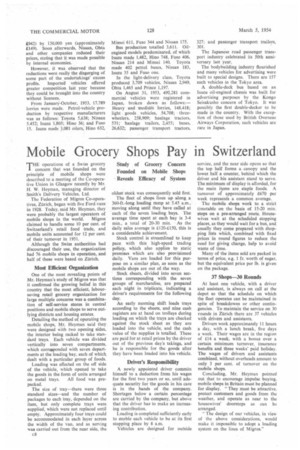Mobile Grocery Shops Pay in Switzerland
Page 46

If you've noticed an error in this article please click here to report it so we can fix it.
Study of Grocery Concern Founded on Mobile Shops Reveals Efficacy of System THE operations of a Swiss grocery concern that was founded on the principle of mobile shops were described to a meeting of the Co-operative Union in Glasgow recently by Mr. H. W. Heyman, managing director of Smith's Delivery Vehicles, Ltd.
The Federation of Migros Co-operatives, Zurich, began with five Ford vans in 1928. Today, said Mr. Heyman, they were probably the largest operators of mobile shops in the world. Migros claimed to handle some 10 per cent. of Switzerland's retail food trade, and mobile units accounted for 12 per cent. of their turnover in 1951.
Although the Swiss authorities had discouraged their use, the organization had 76 mobile shops in operation, and half of these were based on Zurich.
Most Efficient Organization
One of the most revealing points of Mr. Heyman's study of Migros was that it confirmed the growing belief in this country that the most efficient, laboursaving retail grocery organization for large multiple concerns was a combination of self-service stores in central positions and mobile shops to serve outlying districts and housing estates.
Detailing the method of operating the mobile shops, Mr. Heyman said they were designed with two opening sides, the interior being racked to take standard trays. Each vehicle was divided vertically into seven compartments, which corresponded with seven departments at the loading bay, each of which, dealt with a particular group of foods.
Loading was effected on the off side of the vehicle, which opened to take the goods in the form of units arranged
on metal trays. All food was prepacked.
The size of tray—there were three standard sizes—and the number of packages to each tray, depended on the item, but only complete trays were supplied, which were not replaced until empty. Approximately four trays could be accommodated in each layer across the width of the van, and as serving was carried out from the near side, the c8 oldest stock was consequently sold first.
The fleet of shops lines up along a 360-ft.-long loading ramp at 5.45 a.m., moving along until they have called at each of the seven loading bays. The average time spent at each bay is 3-4 min., a total of 20-30 min. As the daily sales average is £l20-l50, this is a considerable achievement.
Stock control is streamlined to keep pace with this high-speed trading policy, which also applies to static premises which are also provisioned daily. Vans are loaded for this purpose on a similar plan, as soon as the mobile shops are out of the way.
Stock sheets, divided into seven sections corresponding with the seven groups of merchandise, are prepared each night in triplicate, indicating a driver's requirements for the following day.
An early morning shift loads trays according to the sheets, and nine cash registers are at hand on trolleys during loading on which the trays are checked against the stock sheet as they are loaded into the vehicle, and the cash value of the supplies is totalled. These are paid for at retail prices by the driver out of the previous day's takings, and he is responsible for the goods after they have been loaded into his vehicle.
Driver's Responsibility
A newly appointed driver commits himself to a deduction from his wages for the first two years or so, until adequate security for the goods in his care is in the hands of the company. Shortages below a certain percentage are carried by the company, but above that the driver has to make an increasing contribution.
Loading is completed sufficiently early to enable each vehicle to be at its first stopping place by 8 a.m.
Vehicles are designed for outside service, and the near side opens so that the top half forms a canopy and the lower half a counter, behind which the driver and his assistant stand to serve. The minimum of display is afforded, for the main items are staple foods. A turnover of approximately £670 per week represents a common average.
Tile mobile shops work to a strict timetable on the basis of 15-20 min. stops on a pre-arranged route. Housewives vait at the scheduled stopping places, as they would wait for a bus, and usually they come prepared with shopping lists which, combined with fixed pricesin round figures to reduce the need for giving change, help to avoid waste of time.
Many of the items sold are packed in terms of price, e.g. I fr. worth of sugar, but the equivalent price per lb. is given on the package,
37 Shops-30 Rounds
At least one vehicle, with a driver and assistant, is always on call at the depot so that the schedule on which the fleet operates can be maintained in spite of breakdowns or other contingencies. To maintain the service on 30 rounds in Ziirich there are 37 vehicles with drivers and assistants.
Drivers work approximately 11 hours a day, with a lunch break, five days a week. Their wages are in the region of £14 a week, with a bonus over a certain minimum turnover, insurance benefits and throe weeks' paid holiday. The wages of drivers and assistants combined, without overheads amount to only 3 per cent. of turnover on the mobile shops.
Concluding, Mr. Heyman pointed out that to encourage impulse buying, mobile shops in Britain must be planned for display. "They must be attractive, protect customers and goods from the weather, and operate as near to the housewives' doorsteps as can be arranged.
"The design of our vehicles, in view of the above considerations, would make it impossible to adopt a loading system on the lines of Migros."




































































































